#agenor
Explore tagged Tumblr posts
Text
Going through the Wrath of the Titans Wikipedia page is so funny bc call me delulu but it really feels like whoever was writing it was salty af.



#and who could blame them lol#greek mythology#ancient greek mythology#greek pantheon#perseus#Agenor#heleus#io#andromeda#Greek heroes#wrath of the titans#clash of the titans
22 notes
·
View notes
Text
Finally managed to finish this:
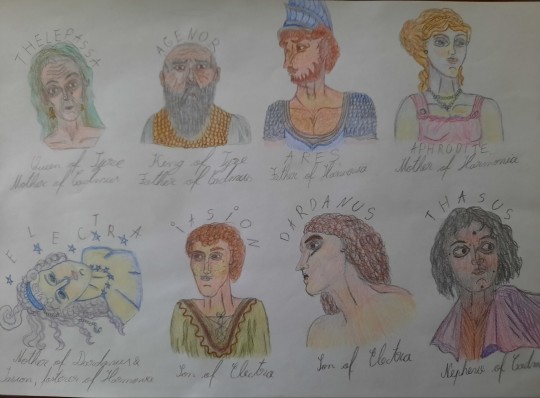
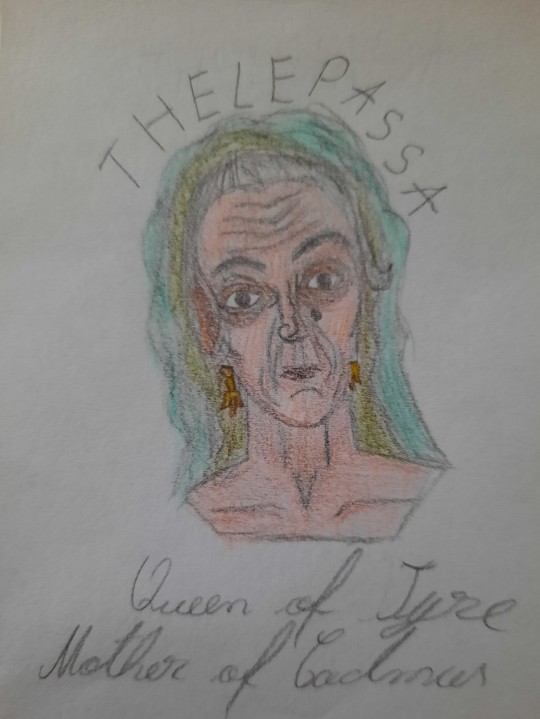
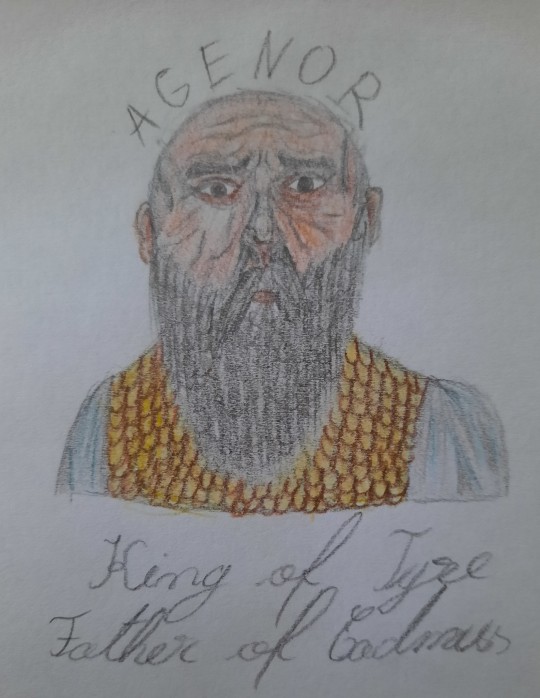
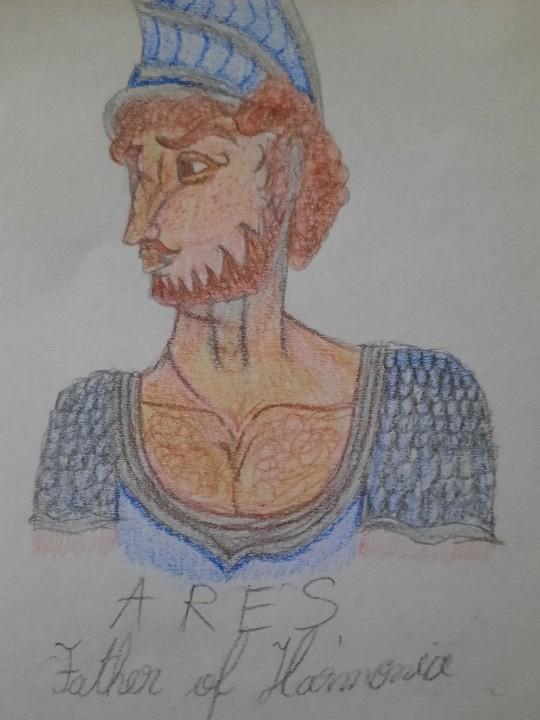
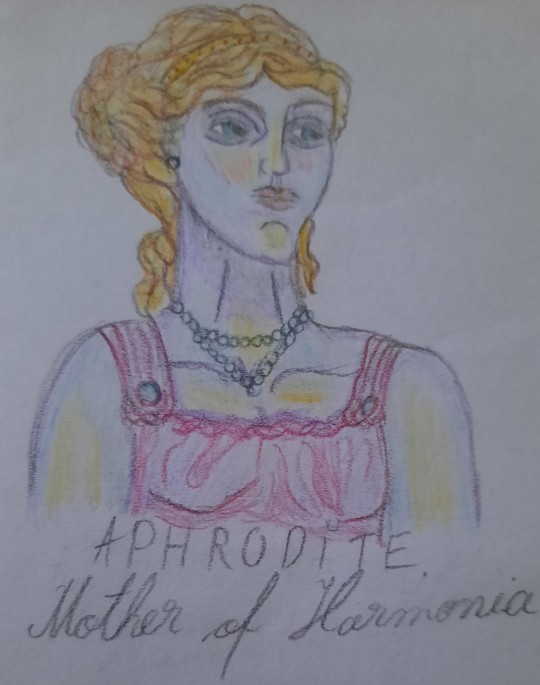
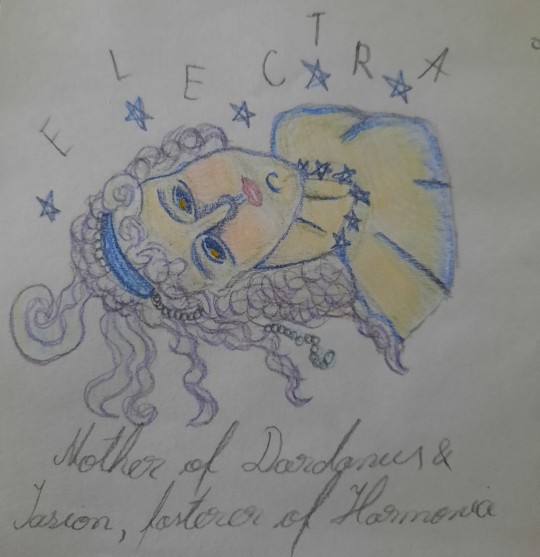
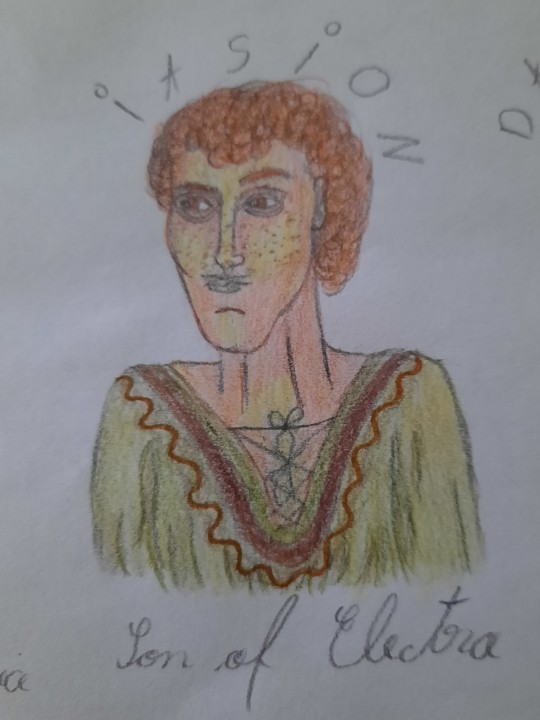
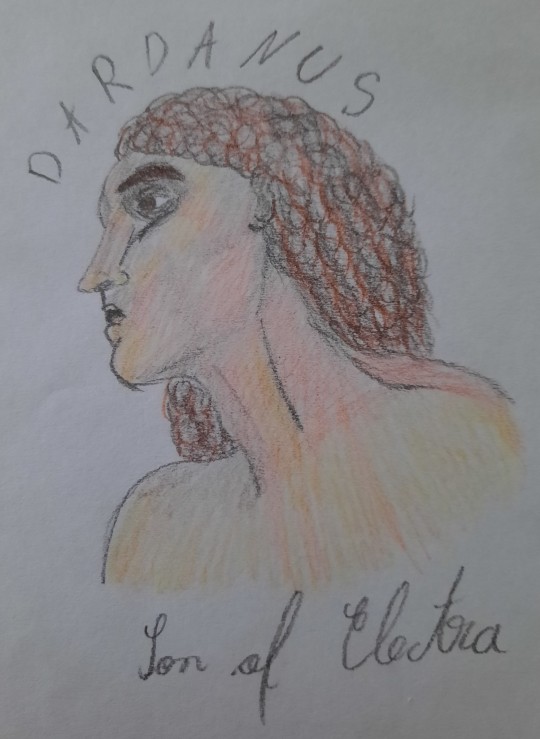
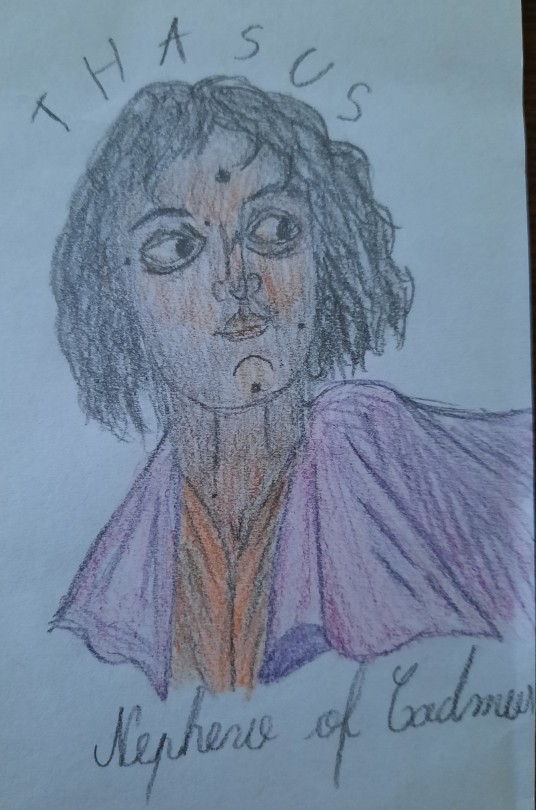
#greek mythology#greek gods#thelepassa#agenor#ares#aphrodite#electra#iasion#dardanus#thasus#greek mythology fanart
14 notes
·
View notes
Text
Imaginen … la cultura de la violación. CLXII.
En la imagen que están compartiendo, se observa un toro blanco de lunar cornamenta posando la palma de su mano izquierda sobre la cadera de la hija de Agenor y Telefasa. Bueno, acaso el toro sea el propietario de una empresa y una empleada la doncella. Acaso tendría que haber usado pezuña y no palma y mano. Y acaso estaba claro y estoy infravalorando la perspicacia de la lectora o del…
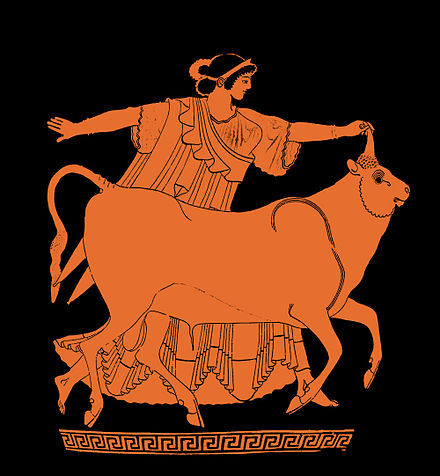
View On WordPress
#Agenor#Albert#Albert Sans#Alumna#Alumnado#Alumnas#Alumno#Alumnos#Anti#Anti-tauromaquia#Antifascismo#Antifascista#Antifranquista#Blanco#Cadera#Claustro#Colegio#Cornamenta#Cueva de Ilotas Exánimes#Cultura#Decencia#Docencia#Docente#Docentes#Doncella#Educación#Empleada#Empresa#Enseñanza#Escítala
0 notes
Text
Pressed so tight against him, drowning in the cedar scent of his skin... She could feel the control trickling from her grip as her attempts to escape weakened.
—Lisette Marshall, Heart of Silk and Shadows
0 notes
Text
i <3 my gay dragons
10 notes
·
View notes
Text
Primavera di libri

Torniamo a suggerirvi nuove letture e film “raccomandati” dai vostri bibliotecari di fiducia.

Un autentico caso letterario l’inedito di Gabriel García Márquez Ci vediamo in agosto, che, come narra la leggenda a proposito dell’Eneide di Virgilio, l’autore avrebbe voluto distruggere: “un omaggio alla femminilità, una storia di libertà e di desiderio che non si sopisce con l’età e nemmeno con l’amore coniugale”. I figli hanno consentito la pubblicazione di questo breve romanzo, che esce in contemporanea in tutti i paesi e ci delizia come una sorpresa inaspettata, nonostante la volontà del suo artefice, forse troppo esigente con sé stesso.

Tutt’altro che deprimente, Piccoli suicidi tra amici di Arto Paasilinna è ormai diventato un classico. Scritto con stile quasi cronachistico, la sua apparente freddezza (che peraltro ben si addice alle gelide lande della Finlandia da cui provengono i personaggi del libro) non fa che accrescere l’ironia, magari un po’ macabra, di cui è pervaso. “… ogni giorno è per ciascuno sempre il primo della vita che gli resta da vivere, anche se siamo troppo occupati per rendercene conto” è la sintesi filosofica di un romanzo divertente, originale, che si risolve in un inno non banale alla vita, alla solidarietà, all’amicizia. Un vero toccasana “per tempi agitati”, citando Mauro Bonazzi, come sono quelli in cui ci troviamo a vivere. Dalla postfazione di Diego Marani: “Una delle cose più belle dei romanzi di Paasilinna è che dopo il tumulto, il fragore e le spericolate rincorse tutto si risolve delicatamente, come una risata di cui resta solo il gioioso ricordo, nell’acqua increspata d’un lago, nel vento della sera, nell’odore di foraggio appena tagliato. … In questo libro la grande beffata è la morte”.
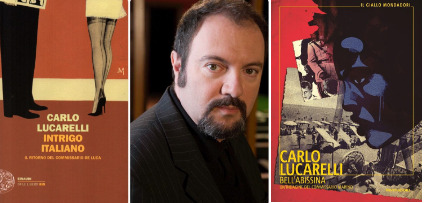
Ambientato a Bologna durante le festività natalizie tra la fine del 1953 e l’inizio del ’54, Intrigo italiano di Carlo Lucarelli ci ripropone la compagnia del commissario De Luca, sempre ombroso, inappetente e drogato di caffeina. Lo accompagna un giovane poliziotto che lo introduce negli ambienti musicali degli amanti del jazz, di cui era appassionato un noto professore morto in circostanze non chiare. Ma il mistero si infittisce quando anche la vedova viene trovata uccisa e De Luca stesso è controllato dai Servizi Segreti. Non siamo più in tempo di guerra mondiale, ma di guerra fredda e anche i migliori si devono aggiornare. Un giallo di classe, con una ricostruzione storica sempre molto accurata. È del 2022 il ritorno del commissario Marino, segretamente ma attivamente antifascista, in Bell’abissina, dopo l’esordio del 1993 con Indagine non autorizzata, quando era ancora soltanto ispettore. Si tratta di un cold case soltanto apparente, perché la serie di delitti, legati da somiglianze via via sempre più chiare, si protrae dal passato al presente pericolosamente minacciato dall’imminente scontro bellico. Marino ha un temperamento diverso da quello di De Luca e si getta anima e corpo in questa indagine che coinvolge corrotti fiancheggiatori del regime. Un incontro, come dice l’autore stesso nei Ringraziamenti, tra la storia, con la s minuscola, frutto di fantasia, e la Storia, quella del secondo conflitto mondiale che Lucarelli conosce molto bene e che ha trattato anche in diverse trasmissioni televisive.

Irresistibile la doppietta di Simenon che vi proponiamo. Gli altri, inedito in Italia fino alla pubblicazione di Adelphi del 2023, è scritto in forma di diario-confessione e ci guida con il suo ritmo irresistibile tra i meandri di un suggestivo castello francese, che racchiude, ça va sans dire, una morte misteriosa, una giovane e affascinante castellana, nonché un burbero e attempato maggiordomo, sospettosamente depositario di ogni segreto… Come sempre, con pochi abili tratti l’autore descrive una serie di personaggi che non potrebbero essere fra loro più diversi, anche se appartenenti alla stessa famiglia: la sua penna riesce a far sembrare del tutto naturali e accettabili legami apparentemente inconciliabili e al limite della moralità. Il finale è riservato all’apertura del testamento: a chi andrà la cospicua eredità del vecchio Antoine Huet? Ma soprattutto: in che modo la ricchezza influirà sulla vita e le abitudini dei protagonisti? A voi il piacere di scoprirlo. Il romanzo La prigione inizia ex abrupto con un misterioso omicidio, su cui la polizia indaga. Ma duplice è la ricerca intrapresa dall’autore: da una parte il movente del delitto, dall’altra la psicologia del protagonista, costretto a scavare nella sua vita per scoprire su sé stesso e sulle persone che gli erano più intimamente vicine segreti che ignorava o che, più probabilmente, cercava di rimuovere per superficialità, paura o inadeguatezza. Così la prigione diventa una metafora per descrivere una vita fasulla che implode in un solo istante di un giorno d’autunno. Al di là del caso limite rappresentato dal fatto di sangue e delle inevitabili differenze di carattere, è talmente accurata l’analisi psicologica che ogni lettore potrebbe ritrovare qualcosa di sé nell’indole del protagonista e comprendere i suoi atti apparentemente privi di logica. Simenon, come sempre, con ritmo inesorabile e accanito vaglio introspettivo ci conduce all’unica soluzione possibile.
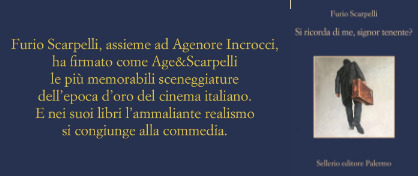
Furio Scarpelli e Agenore Incrocci hanno firmato, sotto la nota sigla di Age&Scarpelli, “le più memorabili sceneggiature dell’epoca d’oro del cinema italiano”, da Totò le Mokò di Bragaglia, a La banda degli onesti di Mastrocinque, C’eravamo tanto amati di Scola, I soliti ignoti, L’armata Brancaleone e La Grande guerra di Monicelli, per citarne solo una minima parte. Tra gli inediti di Scarpelli che Sellerio sta ripubblicando (è del 2019 Amori nel fragore della metropoli) vi consigliamo Si ricorda di me, signor tenente?, romanzo che introduce i protagonisti alternando, con la tecnica del flash back, la narrazione contemporanea al memoriale di guerra. Lo scavo nel complesso passato del personaggio principale porterà alla luce gravi traumi, profondi e rimossi sensi di colpa. Ma chi è lo sgangherato seccatore che apostrofa con la domanda del titolo il vecchio Giulio, tranquillo pensionato che passeggia per le vie della Milano del 1999? Un truffatore, un commilitone o un rigurgito della sua coscienza addormentata? Si legge piacevolmente tutto d’un fiato.
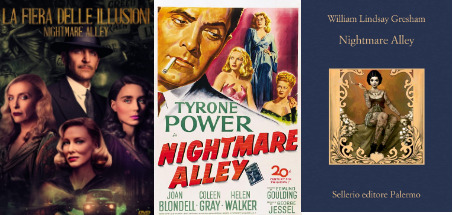
Per una lettura diversa dal solito vi proponiamo Nightmare Alley, La fiera delle illusioni di William Lindsay Gresham, “una tipica storia noir”, da cui sono stati tratti ben due film: un classico con il fascinoso Tyrone Power in una veste per lui inedita e il recentissimo remake di Guillermo Del Toro con Bradley Cooper, Cate Blanchett, Willem Dafoe. Diviso in due parti (con un finale ad anello): da un lato il fantastico, bizzarro, grottesco mondo del circo, con i suoi misteri e le sue crudeltà; dall’altra quello dell’alta borghesia, non meno pericoloso. In sintesi, il libro e i due film sono “Tre facce della stessa storia che presentano tutte letture degne di essere lette e viste per una storia che potrebbe benissimo svolgersi anche al giorno d’oggi. I prestigiatori, che siano o meno appassionati di mentalismo/spiritismo, vi troveranno molti spunti interessanti.”

Un prezioso suggerimento dal passato: se vi fosse sfuggito, potete rimediare cogliendo dai nostri scaffali Il peso falso di Joseph Roth. Un autentico gioiello che mischia allo stile formulare dei poemi omerici, un’autentica passione d’amore e una finissima riflessione sull’essere umano, dominato dai suoi difetti, quasi deterministicamente volto verso il male, incapace di sfuggire alla tentazione del peccato, anche quando è mosso dalle migliori intenzioni. I temi sono quelli consueti della poetica di Roth, e spesso tornano anche gli stessi personaggi, che inevitabilmente cadono nella colpa: il tutto senza pessimismo né amarezza, anzi forse con una leggera sfumatura di fatalistica ironia.
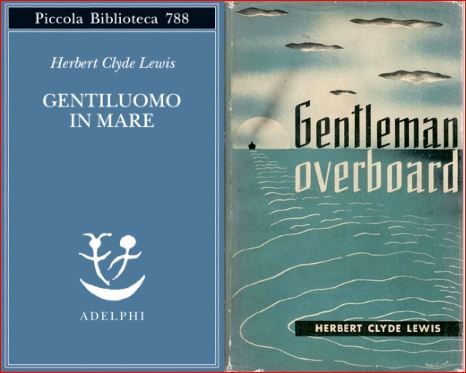
Come una diabolica matrioska le vicende biografiche dell’autore, Herbert Clyde Lewis, giornalista e scrittore americano, nato a New York da ebrei russi emigrati, si ripercuotono sul protagonista del romanzo per poi accanirsi inspiegabilmente sulle vicissitudini editoriali dell’opera che vi vogliamo consigliare, Gentiluomo in mare. Sì, perché come l’autore ebbe una vita difficile, nonostante gli incessanti sforzi profusi per affermarsi e l’indubbio talento, così il protagonista di questo delizioso romanzo breve è vittima di “una sorte bizzarra e cattiva”, per citare la splendida canzone di Lauzi-Conte, e infine la novella fu ingiustamente ignorata alla sua prima pubblicazione nel 1937 per essere poi “ripescata” (è proprio il caso di dirlo) dall’abisso dei libri dimenticati per la prima volta in Argentina nel 2010: da quel momento il successo, più che meritato anche se postumo, divenne planetario. Davvero “una perlita”, come fu definito nella recensione argentina.
#gabriel garcia marquez#arto paasilinna#carlo lucarelli#georges simenon#furio scarpelli#agenore incrocci#william lindsay gresham#joseph roth
14 notes
·
View notes
Text
Mouse family beloved

I'm personally the fighter

I just think he's neat k??

#mouseverse#uncle jeremy#the phantom blot#trudy von tudd#phantom blot#professor doublex#rhyming man#sylvester shyster#Agenore#Aunt Melinda#topolino#shitpost#joke post
34 notes
·
View notes
Text

6m doodles that got a little out of hand
#mostspecialgirldoodletag#oc#ocs#oc art#6monsters#agenor sinai#apollyon hakuten#omecroth#xocth’cthlan#executioner tancred#ist granthiev#ers granthiev#blades of anubis#sinai clan
2 notes
·
View notes
Text
𝐜𝐥𝐨𝐬𝐞𝐝 𝐬𝐭𝐚𝐫𝐭𝐞𝐫 for my beloved @sonnenreich
Sighing, he leaned back and looked out of the window at the rain that pattered incessantly against the thin glass of his office. The aging window seals had softened the varnished wood of the windowsill, and mold had formed in the corners, even when the radiator heat was dry. Isaiah took a sip of his almost completely cold coffee, turned his attention back to his laptop in front of him and wrote the final conclusion of his review:
The real conundrum we face in our endless game of life and death is not the one the movie suggests, but the one we're all trapped in-a never-ending race against time, pressed into shape by a system that fools us into thinking we're in control while it silently shifts the rules. Robitel's movie fails to find any real depth, but it unintentionally reminds us that the biggest trap isn't concrete and puzzles, but expectations, capital and the illusion that there's always a way out. Perhaps the door to the next room has long been open. Maybe we've just forgotten to look.

“Maybe a bit over the top,” Isaiah thought, smirking quietly into his laptop and reminding himself that it wouldn't matter anyway. Maybe this was just his desperate attempt to get something good out of this movie. Yawning, he leaned back and looked around, examining the old desk, which, unlike the others, had not been replaced because he had never expressed the need: he liked the fact that it stood like a relic of days gone by in the far office at the back right, surrounded by the archive, as a testament to better times. Absent-mindedly, he turned a little on his desk chair, on the floor were loose collections of notebooks or paperbacks, on whose spines one could barely read the titles, so often had he read them, taken them with him and studied them again and again. His gaze went to the left, to his notes on the relevance of melancholy in modern literature as a counter-movement to a world where his own life was portrayed more glamorously on social media than it actually was. A gap filler for the last page, which nobody read anyway. And yet he went to great lengths to write texts that had meaning and purpose.
Almost two years ago, The Cultural Zeitgeist, a niche cultural magazine with daring reports and essays designed to provoke thought or discussion, had become The Observer. Structural changes had already begun before that. Gradually, the headlines had changed, becoming more sensational, bigger—and more and more far-fetched. No depth, but tabloid gossip. About the stars and starlets of this world. Scandalous rockers who brawled outside high-class clubs, celebrities who had fallen for some kind of beauty craze, financial ruin due to excessive consumption of intoxicants.
“Secret affair revealed!” “VIP quarrel at the airport!” “She just kicked him out!”
Nothing Isaiah wanted to write. No depth. Nothing that really made a difference. Stories that didn't stay with people or encouraged them to talk to each other and think outside the box, but headlines that sold. “Isaiah, Mr. Miller wants to see you,” Janet told him, and the blonde turned, nodding at her and rubbing his face. Usually people ignored him as long as he delivered. The fact that he had now been called in for an interview couldn't mean anything good. Either he would lose his job straight away or he would have to change departments. And he didn't know which option was worse. Sighing with resignation, he stood up, stretched in the sun, fighting its way through the heavy summer rain, shining through the dirty windows and looked outside. He hated New York. But if you wanted to be something, you had to come here, he had been told. Great.
When he left his small cubicle—if one could call it that—he entered the open-plan office, which looked much trendier than his own. Perhaps he wasn't really sitting in an office, but rather in a utility room. Journalists were typing away excitedly, Harriet and Zane were in the kitchen where a jaunty 'Good Vibes, Bad Decisions' neon sign hung, phone calls were being made and Kris was watering the plants in the spacious office. He absently shoved his hands in his pockets, looked around, surveyed the hustle and bustle, smiled at a few of his colleagues, then averted his gaze when he met with little response.
Joseph Miller leaned on his desk, his legs slightly apart, and went through his appointments for the following day with Janet. “Shall I come back later?” Isaiah finally asked, to which his supervisor waved him off and asked him to sit down. Isaiah did as he was told, sat down at the long meeting desk and looked at the current front page of the magazine, garish letters, lurid headlines. They were reaching deep into the bag of tricks to grab people's attention.
“Pines,” Miller finally spoke to him, turning his attention to Isaiah, who looked up and gazed at him with alert blue eyes. “Carver's out this month, long story. You have to write next week's Fashion Week article.” Isaiah furrowed his eyebrows slightly. On the one hand, he had nothing to do with fashion, but on the other, The Observer didn't seem like they would actually publish an article about fashion week. That made him wonder. He knew exactly what they were after. “We got backstage accreditation for the big shows through contacts, we can go to the pre-party on Sunday. Huge thing, really, the big names in the industry, exclusive insights.” This, most certainly, wasn't his thing. “Maybe I'm not the right person to talk to, I do culture and feature articles, no—”, he tried to explain and revise what he had been told.
“I know I wanted Timothy, Zach and Rachel, but they're in the middle of their research. So you'll have to do it.” So fourth choice. Appreciation at the highest level. “Fashion is a billion-dollar business, Isaiah. An industry full of power games, trends, vanity and people who shape our perception of beauty and status and don't always present the same beauty to the outside world. There's more to it than you think.” Isaiah was at loss for words, really. “Sir, I—” But Miller didn't let him finish. “I need the article. If you don't write it, you can go pack your bags.” That shut Isaiah up. “You wrote about that ancient movie with the two boys the other day.” The blonde considered, furrowed his eyebrows, then looked back up. “Holes?” Miller nodded and coughed. “Yes, exactly, that one. And you criticized it in some way. Do you know what you didn't write about?” A lot, Isaiah thought. “Uhhh... Sploosh?” His superior gave him an irritated look. “About digging, you idiot. So dig.”
Hesitantly, he sat in front of his desk. Of course, this industry had a lot to offer. Even topics that interested him. But none that were suitable for the magazine. Consumer criticism, the dark side of the industry, the cult of superficiality, haute couture in the age of fast fashion—all interesting topics, none of which were suitable. And now he was sacrificing his Sunday to attend some pre-party.
His glass was only half full and yet he hadn't taken a sip. Some expensive booze, he was sure of it. He had never liked champagne. Too much fizz. His Sunday evening could have been so nice: Cooking dinner with his best friend at their shared apartment, who was also off work, to watch horror movies shortly afterwards and look at the photos she had developed. And instead he was here to get an idea, to gather first impressions, in the hope of finding a story worth telling.
Isaiah had struck up conversations, heard names he had forgotten and moved through a web of pleasantries and supposed interest. The party took place in an old château in the middle of New York, radiating grandeur in which Isaiah had never moved before. Bright gold tones, subtle light installations, the people were all smartly dressed, very extravagant, as if they were drawing on the Renaissance and something divine—a recurring motif was the sun. The conversations were a mesh of sounds, clinking champagne glasses here, a laugh (but not too exaggerated so that it still looked good on camera) there.
At some point, he positioned himself a little further away, leaned against the wall and took a few deep breaths, but still resisted the impulse to retreat further or simply leave. His boss would probably fire him for that. He let his gaze wander calmly. Desanti was an Italian fashion label that had managed to move into the same spheres as Gucci, Prada, Dior and co. in just five years. Here, at the exclusive pre-party and one of the many kick-off events of Fashion Week, he had been invited—whatever shady contact had made this possible. Officially, to report on Fashion Week. Inofficially, because he would have been fired if he had refused. So here he was. Dressed up—as much as his wardrobe and fashion sense (or lack thereof) would allow. A plain white cotton shirt, black suit trousers. His black Vans a silent statement that he didn't belong here.
And then a voice rang out. A presenter who welcomed the guests, who said a few warm words that died in the room before they filled it completely. He spoke about the industry, the importance of fashion to people. And then another man was brought on stage, wearing a light-colored suit with golden accents. Alexandre Agénor was introduced as the genius behind the collection. The creative director, who the crowd was currently cheering as he spoke about inspiration and innovation. That one goes back to the important things, back to the origins, so to speak. Isaiah casually clapped as he listened to him speak for five minutes without conveying any content. “But without one person, none of this would have been possible. Because every genius“—presumptuous to call himself a genius, but okay, Isaiah thought—“needs a muse, someone to light the fire inside you.” A meaningful pause as he looked out into the crowd, almost like a loving father, and brought another man on stage.
The applause was still going on, becoming a pulsating echo as Zeev Spindle took the stage and looked around. He too was well dressed, the blonde noticed. He knew him from somewhere. Hadn't he seen him on a magazine cover? Maybe a few weeks ago? He couldn't really remember. Agénor said a few words about him, how they had met in Milan and worked together a lot since then. And while one of them was talking, Isaiah could hardly take his eyes off Zeev. The way the flimsy light settled around his silhouette as he smiled perfectly, letting his gaze wander. And yet, there was something Isaiah couldn't quite grasp, but realized that something wasn't quite right. The slight hesitation before he spoke, the almost too rehearsed movements.
“I haven't seen you before either. What are you doing here?” a woman finally asked him from the side and Isaiah took a moment to collect himself. She was tall, almost the same height as him, with long black hair and dark eye make-up. She casually took a sip of her champagne, her posture confident, her movements dialed, her smile perfect. And before Isaiah could even finish his first sentence, she had interrupted him. “It's crazy, isn't it? This atmosphere! I went to a similar party in Paris last year, but from a different designer, but this one is even more exclusive. You can get your champagne bottle engraved up front, it's so cool. And look at the people! I mean, just incredibly well dressed. You also look—” she eyed him, ”interesting. Rather... minimalist. Totally bold.”
And as she spoke, Isaiah nodded in the right places, sometimes verbally agreeing with her, occasionally glancing up at Zeev as he spoke—and Isaiah still doubted the smile he saw up there—and ultimately handing the microphone back to the brand's creative director. Then he turned his attention back to the woman across from him, the conversation (or rather monologue) just flowing along without Isaiah having to contribute all that much.
#(( i love them in every universe ))#(( also i hate agenor lol ))#sonnenreich#(( aka my everything ))#— * // i see who you are#— ❛❛ // answers ¦ we are unusual and tragic and alive
1 note
·
View note
Note
Airmed's eyes flashed and he stepped toward Agenor.
"I don't care the cost, I don't care if she'd hate it. I don't care if I break every sacred vow I made for this. She was good, she was light, she was life - she was kind Agenor! Why was she alone?! Why was she the one to die?!"
Airmed picked up his sword, he swallowed. He'd told himself he wouldn't take up after the war. They'd lost so much following Nismera into that blind fate war.
"I will avenge her singlehandedly if I must. I will have this world run red if that's what's needed."
No one knew the pure pain that he saw in his oldest friend, he could see it in the way he looked...He heard it within his voice. His stomach churned, his eyes stung for the loss of his sister.
But it wouldn't bring it back, emotions would not reverse any of this. He had people who looked to him, he had people who couldn't have him crumble.
"You know you will always have my backing Airmed," he moved forward and reached out his hand. "But we have to be thoughtful about this, think about our steps. Her death can't be in vein."
2 notes
·
View notes
Text
Alright, I know that timeline in Greek Mythology is pretty screwed up but I need the help of people out there in order to resolve this dilemma really quickly:
So we do know that Libya and Poseidon had twin sons: Belus, King of Egypt, and Agenor, the Phoenician King of Tyre. The real question now is how big was the age difference between Belus' children. The reason why I'm asking this is because Belus had, depending on the sources, different offspring: twin sons named Danaus and Aegyptus, Cepheus and Phineus as later additions and a daughter named Thronia of whom Hermes fathered Arabus (ancestor of arabs). Danaus fathered Hypermenstra (AKA the only one of the Danaides who didn't murder her husband), who married Lynceus. They two had a son named Abas, whom we don't know much about besides the fact that he was cool and badass, only for his children to be Acrisius and Proteus. Acrisius is the father of Danaë who is the mother of Perseus, which would make Belus Perseus' fourth great-grandfather. Meanwhile, another son of Belus was Cepheus, who was the father of Andromeda who was contemporary with Perseus. Despite the fact that Andromeda was the granddaughter of Belus, whereas Perseus was the fourth great-grandson of the exact same guy.

To make things even more frustrating, Belus' twin brother (again, twin brother) was the father of Cadmus who was the father of Semele who was the mother of Dionysus who was contemporary with Perseus at one point, given the fact that they two wete at war (long story). And in this case Perseus should've technically been really old when this event happened, given the fact that Dionysus was contemporary with his wife Ariadne who was initially in a relationship with Theseus who was contemporary (give or take a few decades) with Heracles who is Perseus' great-grandson.
I even had to draw this stupid thing while making this post so that I won't make any mistakes:
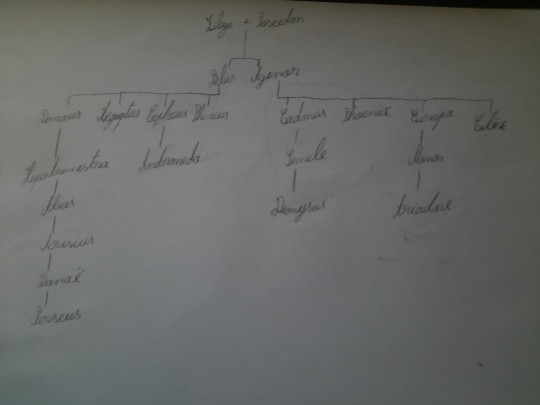
And honestly a lot of these questions could've been easily answered if the ancient greeks would've cared to specify the age differences between each one's children as well. Because for some reason timeline seems more messy than it's supposed to be.
#greek mythology#perseus#princess andromeda#cadmus#dionysus#ariadne#belus#agenor#danaus#acrisius#danae#semele#theseus#heracles#ramblings
12 notes
·
View notes
Text
youtube
❤️
#Youtube#cazuza#exagerado#videoclip#music#música#brazilian music#brazil#brasil#Agenor Miranda de Araújo Neto#cantores#rock#blues rock#mpb#música popular brasileira
2 notes
·
View notes
Text
spinning gay dragons around in my brain
1 note
·
View note
Text
Honestly one of the best parts of the iliad.
Ares: *losing as usual, nothing new*
Poseidon: *fondly reminiscing his companionship with Apollo when they both worked as slaves while also challenging him to a fight just because*
Apollo: nahhhhh *insert profound and smart quote about the nature of humanity*
Artemis: you coward, f@#king b#&@ p<$$y
Apollo: *ignores the hell out of her* whatever I should get back to the war
Artemis: *gets smacked by Hera and ends up crying and complaining about it*
Hermes: I'm not crazy enough to fight someone who was crazy enough to sleep with Zeus ✌️
Obsessed with BkXXI:383-525 of the iliad actually. This is after Achilles fights a river (and LOSES) before getting rescued by some gods. Then up on Olympus we have a brief little intermission. The girls are fighting
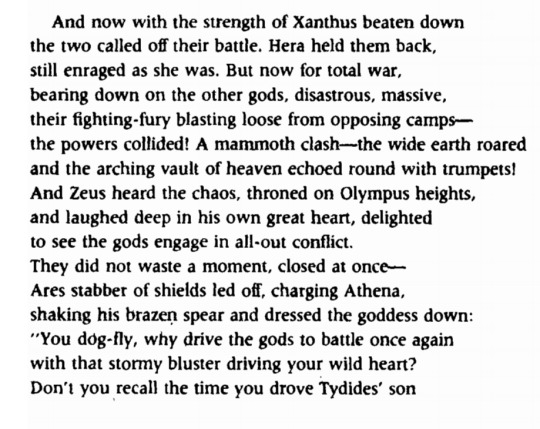
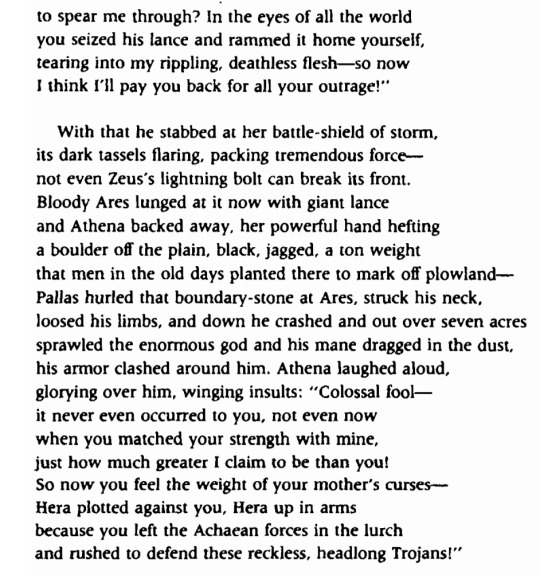
Ares challenges Athena, calling her a gadfly and saying she'll pay for enabling Diomedes stabbing him a few books back. He goes and stabs her shield, and she steps back and knocks him out with a stone. Then she laughs and gloats over his vaguely unconscious body, laughing over how his mom isn't even on his side. Youch. If I were ares I'd just die tbh
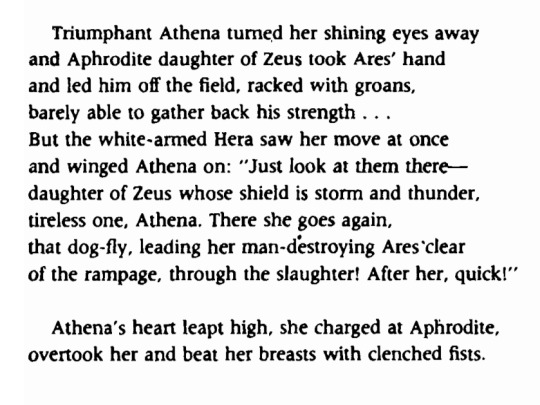
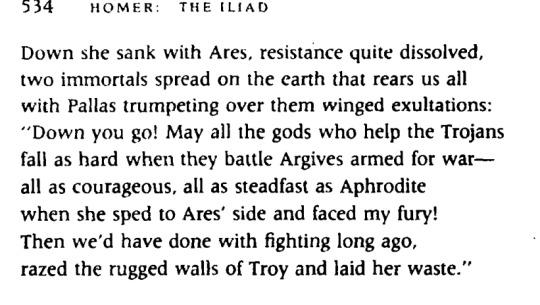
THEN. WHILE SHE ISN'T LOOKING. Aphrodite helps ares up and they try to sneak off, but Hera snitches on them both and sics Athena on them. That's so sad actually. Imagine your own mom sending her stepdaughter to body you and your girlfriend. Athena strikes Aphrodite and both her and ares fall to a heap on the ground. Athena continues gloating.
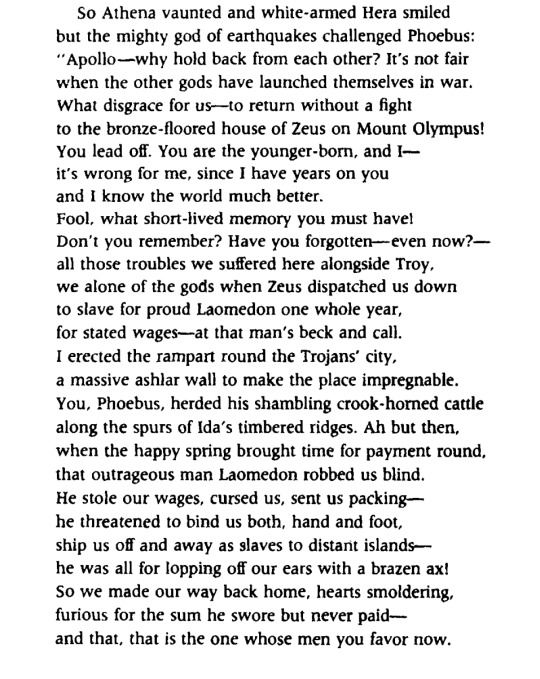
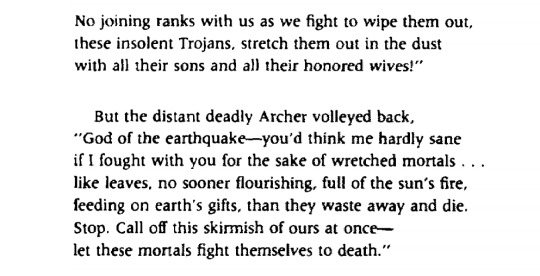
Poseidon sees this and feels left out somehow. My guy turns to his nephew and tries to goad him into fighting, even offering Apollo the first punch because he's older and more experienced. How shameful would it be to go back home without fighting with your nephew. Truly a disgrace. He's me fr. the girls are fighting and so must i. Apollo, smartly, declines this, saying that he'd be insane to fight his uncle over some mortals' quarrel.
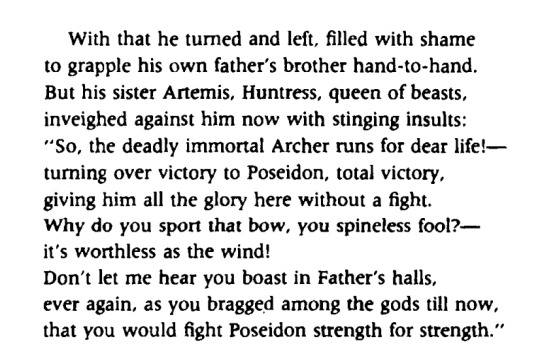
And then Artemis calls him a pussy. Calls him spineless. Bitch why are you carrying a bow if you won't even fight. Reveals that he's boasted about beating Poseidon before. This is so sad, this is worse than my family reunions. Apollo doesn't respond but HERA on the other hand.
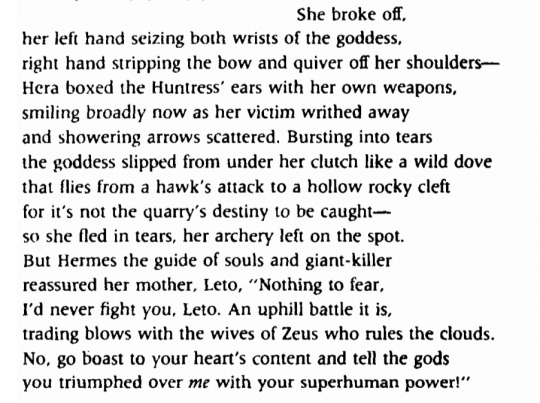
SHE TAKES ARTEMIS' BOW AND QUIVER AND BEATS HER UP WITH IT?? JUST ABSOLUTELY WHALES ON HER UNTIL SHE STARTS SOBBING AND RUNS AWAY? She leaves her weapons behind, and Hermes sees this. He tells Artemis' mother Leto that he has no quarrel with her, not wanting to get in trouble with Zeus. He offers to let her say that she bested him in combat and she takes her daughter's weapons and leaves to go after Artemis.
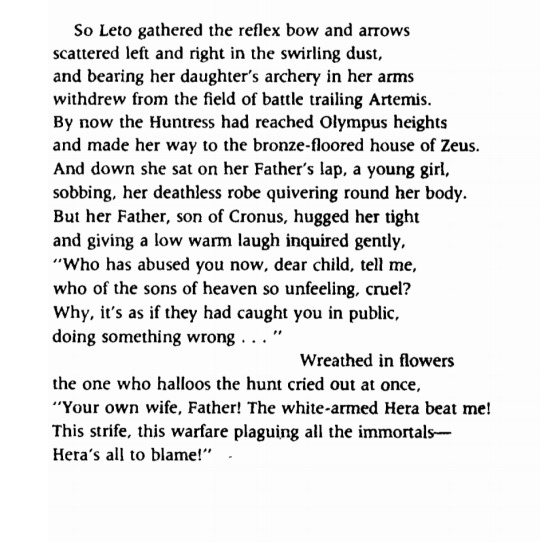
Then Artemis goes running to daddy and cries at his lap. Zeus hugs her (and I will say this time and time again. That man is a girl dad it is so funny. He will spit in ares' face and then laugh at Athena's jokes) and asks what's wrong. Artemis says Hera is to blame
Obsessed with "Why, it's as if they had caught you out in public doing something wrong..."
It's giving "is there something you forgot to tell me?"
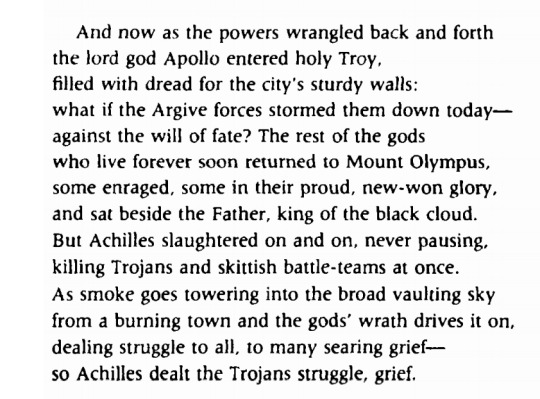
All the rest of the gods then sulk back home to Olympus, all but Apollo, who flies back to troy to make sure Achilles isn't causing Too Much damage which is hilarious because that man was on the verge of tears getting his ass beat by a river a few lines back
#this part is light hearted compared to most of the book#but all I wanna say is justice for Ares and Artemis they got done dirty#Also Apollo telling Poseidon to just let the humans battle reminds of#the part where him and Athena decide to team up and turn into birds#and watch the humans fight#ALSO the next part is also pretty amusing#where Apollo tranforms into Agenor (i think?) and tricks Achilles into chasing him#only to reveal himself in the end and laugh in Achilles' face#I love when Achilles gets bullied a little ngl#mannn I need to reread the Iliad#but this time on a physical copy cause screens give me mad headache#The Iliad#also remember how Nonnus writes VERY similar scenario in his epic Dionysiaca? 😭😂#that man straight up copied Homer no shame#but I won't complain much cause it has apollo consoling artemis after Hera kicked her ass#that was sweet
488 notes
·
View notes

